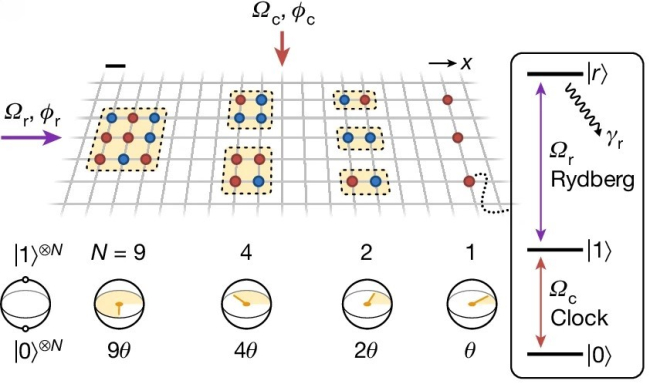Multi-qubit gates and Schrödinger cat states in an optical clock
| Author | |
|---|---|
| Abstract |
Many-particle entanglement is a key resource for achieving the fundamental precision limits of a quantum sensor1. Optical atomic clocks2, the current state of the art in frequency precision, are a rapidly emerging area of focus for entanglement-enhanced metrology3–6. Augmenting tweezer-based clocks featuring microscopic control and detection7–10 with the high-fidelity entangling gates developed for atom-array information processing11,12 offers a promising route towards making use of highly entangled quantum states for improved optical clocks. |
| Year of Publication |
2024
|
| Date Published |
2024/09/01
|
| Journal Title |
Nature
|
| Volume |
634
|
| Issue |
8033
|
| Start Page or Article ID |
315-320
|
| ISBN Number |
1476-4687
|
| DOI | |
| URL | |
| Download citation | |
| JILA PI | |
| Related JILA Highlights | |
| Associated Institutes | |
Journal Article
|
|
| JILA Topics | |
| Publication Status | |
| Publication Image |

|


 The Physics Frontiers Centers (PFC) program supports university-based centers and institutes where the collective efforts of a larger group of individuals can enable transformational advances in the most promising research areas. The program is designed to foster major breakthroughs at the intellectual frontiers of physics by providing needed resources such as combinations of talents, skills, disciplines, and/or specialized infrastructure, not usually available to individual investigators or small groups, in an environment in which the collective efforts of the larger group can be shown to be seminal to promoting significant progress in the science and the education of students. PFCs also include creative, substantive activities aimed at enhancing education, broadening participation of traditionally underrepresented groups, and outreach to the scientific community and general public.
The Physics Frontiers Centers (PFC) program supports university-based centers and institutes where the collective efforts of a larger group of individuals can enable transformational advances in the most promising research areas. The program is designed to foster major breakthroughs at the intellectual frontiers of physics by providing needed resources such as combinations of talents, skills, disciplines, and/or specialized infrastructure, not usually available to individual investigators or small groups, in an environment in which the collective efforts of the larger group can be shown to be seminal to promoting significant progress in the science and the education of students. PFCs also include creative, substantive activities aimed at enhancing education, broadening participation of traditionally underrepresented groups, and outreach to the scientific community and general public.